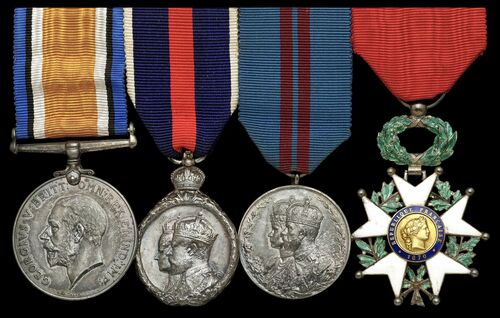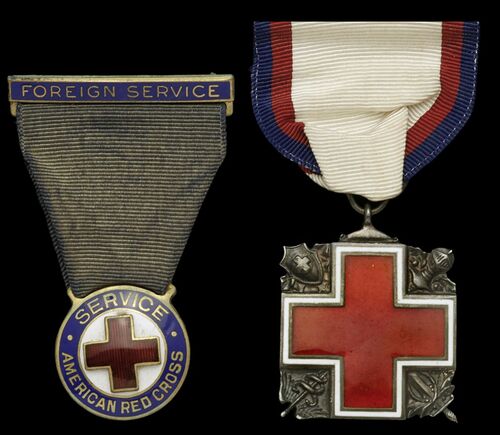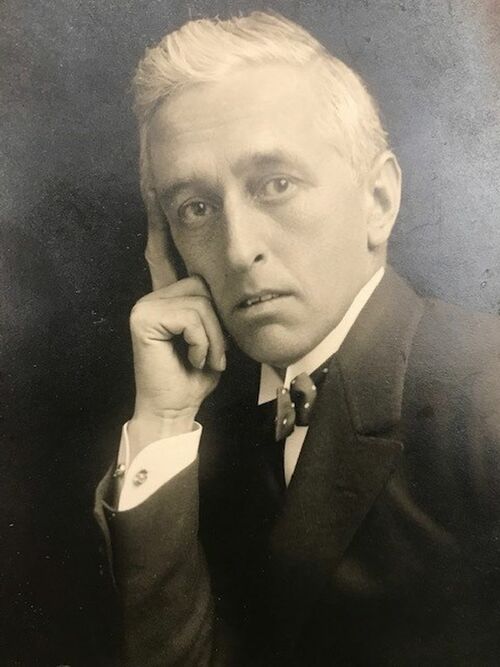Auction: 24001 - Orders, Decorations and Medals
Lot: 96
The campaign group of six awarded Sir Robert Hudson, G.B.E., K.St.J., British Red Cross, a noted political organizer and major figure in the Liberal Party and who served with the British Red Cross in the Great War
British War Medal 1914-20 (Sir R. Hudson.); Coronation 1902, silver issue; Cornation 1911; France, Legion of Honour, Knight's breast Badge, silver-gilt, silver and enamel; American Red Cross Medal (Sir Robert A. Hudson for Service American National Red Cross 1917-1918); American Red Cross Medal, first four mounted as worn, very fine (6)
[G.B.E.] London Gazette 1 January 1918 (Treasurer and Financial Director of the Joint Committee of the Red Cross Society and the Order of St. John of Jerusalem in England).
[Order of St. John, Knight of Grace] London Gazette 4 March 1921.
Robert Arundell Hudson was born on 30 August 1864 at Lapworth, Warwickshire, he was the eldest son of Robert Hudson of Lapworth and his wife Jessie, daughter of John Kynoch of Peterhead. He was briefly educated at Ludlow Grammar School but this was cut short at the age of sixteen, when he was sent to South Africa for his health. The following year he was placed in an office in Birmingham, where it is supposed that he came under the spell of Bright and Chamberlain.
He obtained a post in the National Liberal Federation in 1882 which had been founded in Birmingham five years earlier. Hudson quickly attracted the notice of the secretary, Francis Schnadhorst, and was appointed assistant secretary in 1886. In this same year as a result of the defection of Chamberlain, and therefore of Birmingham, on the question of home rule, the offices of the federation were transferred to London.
In 1893 he became secretary, and held that position until April 1922 when he retired and was made treasurer, retaining the Hon. secretaryship of the Liberal Central Association, to which he had been appointed in 1895, but resigned the latter office in 1927. He was secretary of the National Liberal Federation for nearly 30 years, a period longer than any yet recorded in any similar office in any political party in the United Kingdom.
Hudson occupied a position in the councils of the Liberal Party, and wielded a private influence on its fortunes, of a nature almost without precedent in British political annals. When the Liberal reunion took place soon after 1903 leading up to the Liberal victory of 1906, it became apparent that "Robert", as he was affectionately called by friend and foe, had played a vital part in that great triumph. He sought no reward, joined wholeheartedly in tributes to others, and was always ready and eager to pass on opportunities to anyone likely to render service to the political cause for which he cared so much. His knighthood, in 1906, was the first to be conferred on any party agent.
Hudson served under four Liberal Prime Ministers- Mr. Gladstone, Lord Rosebery, Sir H. Campbell-Bannerman, and Mr. Asquith. Mr. Lloyd George cannot be added to the list it is because Sir Robert declined to support the Coalition Government which was formed in 1916.
When the Great War broke out in August 1914 he was neither a member of the British Red Cross Society nor of the Order of St.John, but he accepted the invitation of both to become the chairman of their Joint Finance Committee. He went out to France in 1915 with the British Red Cross and was entitled to just a British War Medal.
The Times Fund raised altogether the immense sum of 16 million pounds for the sick and wounded, and to how great an extent the steady flow of gifts from every profession, trade, industry, and class in the country throughout the war was due to Sir Robert Hudson's business capacity, personal charm, and rare combination of sagacity and enthusiasm can never be fully known. When on February 9, 1919, Sir Robert attended at Printing House-Square to present Red Cross medals to the printers and other members of The Times staff who had been concerned in the daily publication of the Red Cross appeal the Editor spoke of him as "one whose name has been printed in The Times more constantly, more conspicuously, and to better purpose than that of any other living Englishman." It may be doubted whether in the long history of voluntary charitable effort in this country any one man ever carried a greater burden to such triumphant success. The readers of The Times were munificently generous, but it was Sir Rbert Hudson ho so guided and managed their munificence that it brought the greatest possible relief to the sickness and suffering entailed by the war.
The American Red Cross, London Chapter, 40 Grosvenor Gardens, London, S.W.1.
October 17, 1917
Mr Dear Sir Robert: The American Red Cross takes great pleasure in subscribing for "Our Day" 200,000 to be used for the following purposes: "50,000 for relief and comforts to sick and wounded in hospitals, casualty clearing stations and on lines of communication in territories where British forces are fighting. "50,000 for the maintenance of British Red Cross auxiliary hospitals and convalescent homes in England. "100,000 for institutions in Great Britain for orthopedic and facial treatment and for general restorative work for disabled British soldiers.
The distribution of these funds is, of course, to be entirely at your discretion.
May I express the peculiar satisfaction that we feel in making this subscription? From the standpoint of our best judgment we rejoice in an opportunity to assist in the superb work that you are doing to relieve suffering and distress. But, in a larger way, we hope that you will accept our contribution as an earnest of the desire of our people to begin to take our share of the burden of the war which your forces have waged for three years on behalf of the whole civilized world.
Very truly yours, (Signed) Grayson M.-P.Murphy, Major, A. R. C., U.S.A., American Red Cross Commissioner for Europe.
Sir Robert Hudson placed his remarkable judgement and business capacity at the service of other works of national importance. He was a devout Churchman, with a special affection for Westminster Abbey, under the shadow of which he spent most of his life; and, when The Times raised a fund as permanent provision for the repair and preservation of the Abbey, he consented to become one of the three trustees.
In 1889 he married Ada, daughter of the late Mr. Henry Hammerton, of Coventry; she died in 1895. In 1923 he married in the private chapel of Hartlebury Castle, the residence of the Bishop of Worcester, Dame Mary Elizabeth, widow of Viscount Northcliffe, of both of whom he had long been a close personal friend.
In addition to his political work he had the following appointments: Joint Treasurer of Westminster Hospital; Treasurer of the Sulgrave Manor Board; Trustee of Cassel Hospital, Swaylands; Member of the Imperial War Graves Commission and of the Voluntary Hospital Commission; Director of Sun Insurance Office and Sun Life Assurance Society; Patron of the living of Theydon Mount with Stapleford Tawney.
Hudson died at 25 Park Crescent, London, on 25 November 1927, leaving his wife and daughter from his first marriage. His ashes are buried in the west cloister of Westminster Abbey. For his miniature Dress medals, please see Lot 346.
Subject to 20% VAT on Buyer’s Premium. For more information please view Terms and Conditions for Buyers.
Sold for
£1,200
Starting price
£520









